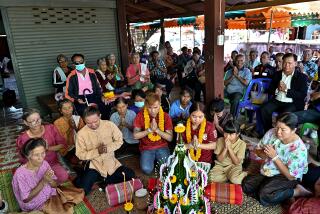Freed Hostage’s Wife Says He ‘Suffered a Lot’ : Gulf crisis: Family members in Fullerton prepare for his homecoming today.
- Share via
FULLERTON — The wife of released American hostage Randall Trinh said Sunday that he suffered “a lot of stress and fear” while being held as a so-called human shield in an Iraqi military factory but that his peptic ulcer is improving now.
“In Iraq, he was with a lot of stress and fear and anguish. The stomach is still bothering him, but with the prospect of seeing his family again, he felt great,” said Kim Yen Trinh, who has spoken with her husband twice by telephone since he was released Saturday from Iraq along with three other ailing Americans.
Sunday night, the Fullerton family was preparing for Trinh’s arrival today at Los Angeles International Airport. A daughter was making welcome home banners, while his wife was thinking about making her husband a nice, hot pot of homemade soup for his first meal back home.
“The special thing is, is that he’s going to be here tomorrow,” said Kim Yen Trinh.
Trinh’s captivity was hardly the family’s first crisis situation, she said, speaking from an apartment she shares with a daughter in Fullerton.
The Trinhs left South Vietnam on a barge the day before the fall of Saigon in 1975 and were towed out to sea by a tugboat before they were picked up by an American warship, she said.
They became U.S. citizens in 1982. Randall Trinh, a structural engineer, went to Kuwait five years ago to work for Santa Fe International Corp., a drilling and construction firm owned by Kuwait Petroleum Corp. His wife joined him two years ago. She was in Paris, on her way back to Kuwait from a visit to the United States, when the Iraqis invaded Kuwait on Aug. 2.
After the invasion, Randall Trinh hid out in the couple’s apartment in Kuwait city, initially telling Iraqi soldiers who searched the building that he was a Vietnamese citizen who had lost his passport, she said.
Later, when American diplomats relayed an Iraqi promise of safe passage, he traveled to Baghdad along with other foreigners hoping to fly out of Iraq. But he was trapped when the Iraqis declared that American men would not be allowed to leave, his wife said.
At first, Trinh, 49, was held with other foreigners at a luxury hotel, she said. But early last week he was moved to a factory as part of Iraq’s policy of keeping some foreigners at strategic sites to discourage attack by Western forces massed in Saudi Arabia.
“Five days prior to release, he was taken to the installation, and it was frightening,” she said.
There, she said, his ulcer flared up, and he suffered acute pain before being transferred to a hospital. The intervention of a delegation from the Fellowship of Reconciliation, a New York-based pacifist group, helped free him and the three other Americans.
“I feel grateful, and I feel lucky and happy,” she said. Trinh, who flew from Baghdad to Amman, Jordan, is due to arrive today at Los Angeles International Airport via Cyprus, London and New York.
Kim said her husband, who is adevout Buddhist, told her in a letter that one of the problems with his diet in Iraq was that they always served him meat.
During fasting, she said, “he doesn’t eat meat, and although he’s not a vegetarian, we, as Buddhist, stop eating meat from time to time. I know that he always had to ask for vegetables.”
His wife said this wasn’t the first time the couple had to endure a long separation.
In 1970, Trinh left his wife and two children in Vietnam to study in the United States. She said he studied for three years with “no phone calls or visits,” and communicated only by letters.
“He returned home in 1973, and in 1975 we left the country when Saigon fell. But in 1985 again, he left for Kuwait and during the next three years, I saw him only three times. So these long separations are nothing new, but the circumstances of this one were obviously different,” she said.
When she heard the news that her husband had been freed and allowed to leave Iraq, she was elated.
On Sunday however, she said she was having difficulty waiting for his arrival.
“One thing is that I can hardly wait for him. We’re trying to keep ourselves busy so we don’t end up counting the minutes, but it’s so hard,” she said.
“At least, there is one good thing, I know that he’s out, out of Iraq. Knowing that, I can wait another week, even a month if necessary, as long as I know he’s outside of Iraq and safe.”
Times staff writer David Reyes contributed to this story.
More to Read
Sign up for Essential California
The most important California stories and recommendations in your inbox every morning.
You may occasionally receive promotional content from the Los Angeles Times.













